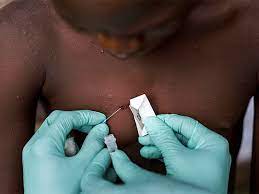Barely 2 years after the world was put on hold because of the deadly coronavirus that disrupted the economical and social activities of many nations, claiming millions of lives worldwide, mankind is faced with yet another catastrophe, the monkeypox virus.
Monkeypox is a rare disease caused by a brick-shaped virus carrying a double-strand of DNA. The virus that causes monkeypox was first discovered at the end of the 1950s, but there are signs it has undergone changes in the past three to four years which has enabled it to pass between humans more easily.
There are two distinct genetic clades of the monkeypox virus: the central African (Congo Basin) clade and the west African clade. The Congo Basin clade has historically caused more severe disease and was thought to be more transmissible. The geographical division between the two clades has so far been in Cameroon, the only country where both virus clades have been found.
Nigeria has recorded cases of the monkeypox virus since 2017 when it first broke out in the country.
On 26 May 2022, The Federal Government of Nigeria and the Nigeria Centre for Disease Control (NCDC) activated a national multisectoral emergency operations centre for monkeypox at level 2 to strengthen and coordinate ongoing response activities in the country while contributing to the global response.
According to the centre, as of 28th May 2022, a total of 21 confirmed cases have been reported from Adamawa (5), Lagos (4), Bayelsa (2), Delta (2), Cross River (2), FCT (2), Kano (2), Imo (1), Rivers (1). Recent cases of monkeypox have been reported among US travelers returning from Lagos and Ibadan.
Updates provided on the NCDC website from 2017 to 2022 confirmed that Nigeria has experienced a large outbreak of the monkeypox virus with over 500 suspected cases and over 200 confirmed cases and a case fatality ratio of approximately 3% with 12 deaths. Cases are still reported until today.
Data from the Africa Centres for Disease Control and Prevention shows that, since 2020, there have been some 12,500 (reported) monkeypox cases across the continent, with at least 365 deaths.
Symptoms of the monkeypox virus include fever, headache, muscle aches, and swollen lymph nodes, followed by a rash. Infected persons are usually ill for 2–4 weeks, after about 1 to 3 days of fever, the rash erupts beginning on the face and then spreading to the body with the face and palms/soles being mostly affected.
Some three to four weeks after infection, the blisters will eventually scab over and fall off, leaving a scar, however, this is common in people who recover. There is no specific treatment for the virus other than medicines used to treat the symptoms. And like most diseases, the chances of getting seriously ill or dying depend on factors such as your age and level of immunity.
Unlike the virus that causes Covid-19, which primarily spreads through tiny droplets expelled as a person breathes and is considered highly infectious, monkeypox is not as readily transmissible, it relies on close physical contact, usually prolonged one to pass from person to person or animal to person.
Prior vaccination against smallpox may provide protection against monkeypox as it has symptoms similar to those seen in past smallpox patients, but clinically less severe.
Initially, monkeypox occurs throughout Central and West Africa, often near tropical rainforests, and has been increasingly appearing in urban areas.
In order to prevent the spread of the monkeypox virus, specialists have warned against the consumption of bush meat as various animal species have been identified to be reservoirs that can circulate the virus. Animal hosts include a range of rodents and non-human primates that includes rope squirrels, tree squirrels, Gambian pouched rats, dormice, non-human primates, and other species.
The World Health Organisation (WHO) revealed that most human infections have resulted from animal-to-human transmission, and unprotected contact with wild animals, especially those that are sick or dead, including their meat, blood, and other parts. Additionally, all food items containing animal meat or parts must be thoroughly cooked before eating.
NCDC has also warned that there is a possibility the monkeypox virus can be transmitted through sexual intercourse as the virus is present in the body fluids of infected individuals and transmissible to humans through sexual contact.
Dr Moses Nokot, a medical practitioner with the Aminu Kano Teaching Hospital, Kano State told Neptune Prime that monkeypox is described as a self-limiting illness that often lasts for two to four weeks, he advised Nigerians to avoid bushmeat so as to prevent an outbreak of the virus in the country.
Dr Nokot said that there have been sporadic cases of monkeypox, and it is fatal in as many as 1 to 10% of people who become infected. But even if the chances of dying are relatively low, patients with monkeypox have reported how painful and debilitating it is.
The true burden of monkeypox is not known. For example, in 1996–97, an outbreak was reported in the Democratic Republic of the Congo with a lower case fatality ratio and a higher attack rate than usual. A concurrent outbreak of chickenpox (caused by the varicella virus, which is not an orthopoxvirus) and monkeypox was found, explaining real or apparent changes in transmission dynamics in the virus, stated in a report by BBC.
Monkeypox is now a global public health importance as it not only affects countries in west and central Africa but the rest of the world. In 2003, the first monkeypox outbreak outside of Africa was in the United States of America and was linked to contact with infected pet prairie dogs. The pets had been housed with Gambian pouched rats and dormice that had been imported into the country from Ghana.
The outbreak led to over 70 cases of monkeypox in the U.S. Monkeypox has also been reported in travelers from Nigeria to Israel in September 2018, to the United Kingdom in September 2018, December 2019, May 2021, and May 2022, to Singapore in May 2019, and to the United States of America in July and November 2021.





